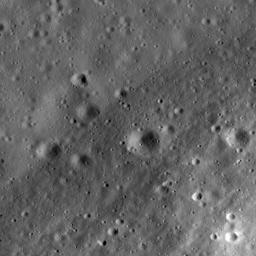
|
Riccioli Crater: Cracked, Melted, and Draped
- Click the image above for a larger view
- Full-Res JPEG (1000 x 1000) (120.4 kB)
- Full-Res TIFF (1000 x 1000) (1.0 MB)
Caption:
High-resolution LROC view of part of the floor of Riccioli Crater, near the center of the Constellation region of interest. The view is centered on the boundary between a spur of the crater's central peak materials (lower right half of the image) and volcanic lava flow deposits (upper left half). The central peak materials are rougher and show a faint pattern of lines running NE-SW, suggesting that this terrain, like much of the rest of the crater, was scoured by ejecta from the younger Orientale impact basin to the southwest. Part of NAC frame M114444141LE, image width is 500 m and north is up.
Riccioli Crater is named after Italian astronomer and Jesuit priest Giovanni Battista Ricciolo (1598-1671) who, along with colleague Francesco Maria Grimaldi, named and catalogued many of the Moon's larger craters, including the prominent crater Copernicus.
Background Info:
NASA's Goddard Space Flight Center built and manages the mission for the Exploration Systems Mission Directorate at NASA Headquarters in Washington. The Lunar Reconnaissance Orbiter Camera was designed to acquire data for landing site certification and to conduct polar illumination studies and global mapping. Operated by Arizona State University, the LROC facility is part of the School of Earth and Space Exploration (SESE). LROC consists of a pair of narrow-angle cameras (NAC) and a single wide-angle camera (WAC). The mission is expected to return over 70 terabytes of image data.
Cataloging Keywords:
| Name | Value | Additional Values |
|---|---|---|
| Target | Moon | |
| System | Earth | |
| Target Type | Satellite | |
| Mission | Lunar Reconnaissance Orbiter (LRO) | |
| Instrument Host | Lunar Reconnaissance Orbiter | |
| Host Type | Orbiter | |
| Instrument | Lunar Reconnaissance Orbiter Camera (NAC) | |
| Detector | Narrow Angle Camera (NAC), Wide Angle Camera (WAC) | |
| Extra Keywords | Crater, Grayscale, Impact, Volcano | |
| Acquisition Date | ||
| Release Date | 2010-02-20 | |
| Date in Caption | ||
| Image Credit | NASA/GSFC/Arizona State University | |
| Source | photojournal.jpl.nasa.gov/catalog/PIA12950 | |
| Identifier | PIA12950 | |
